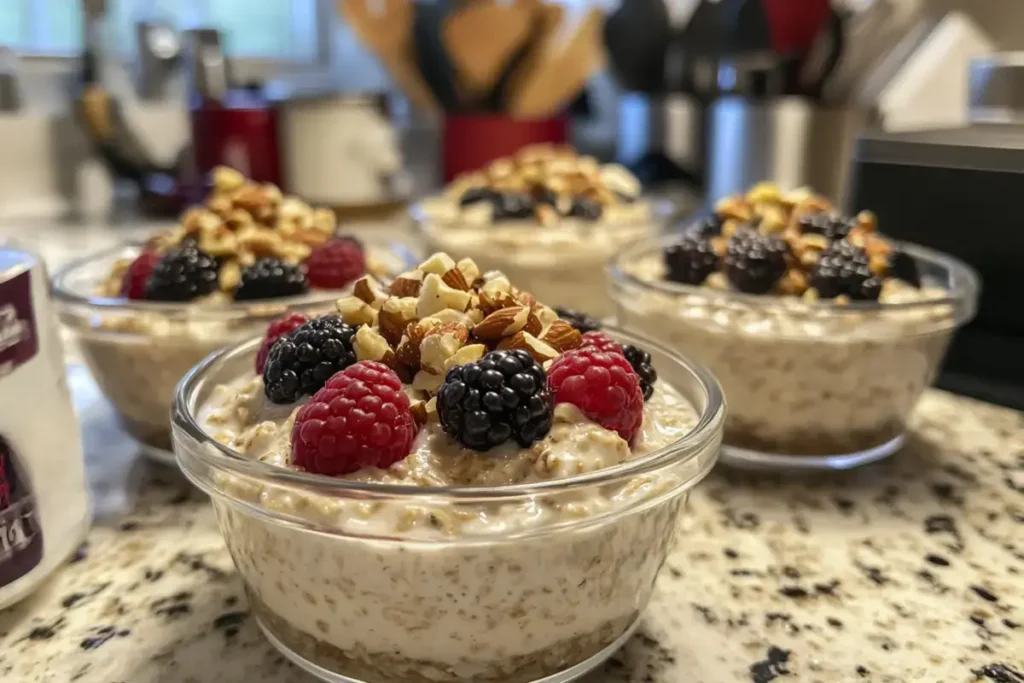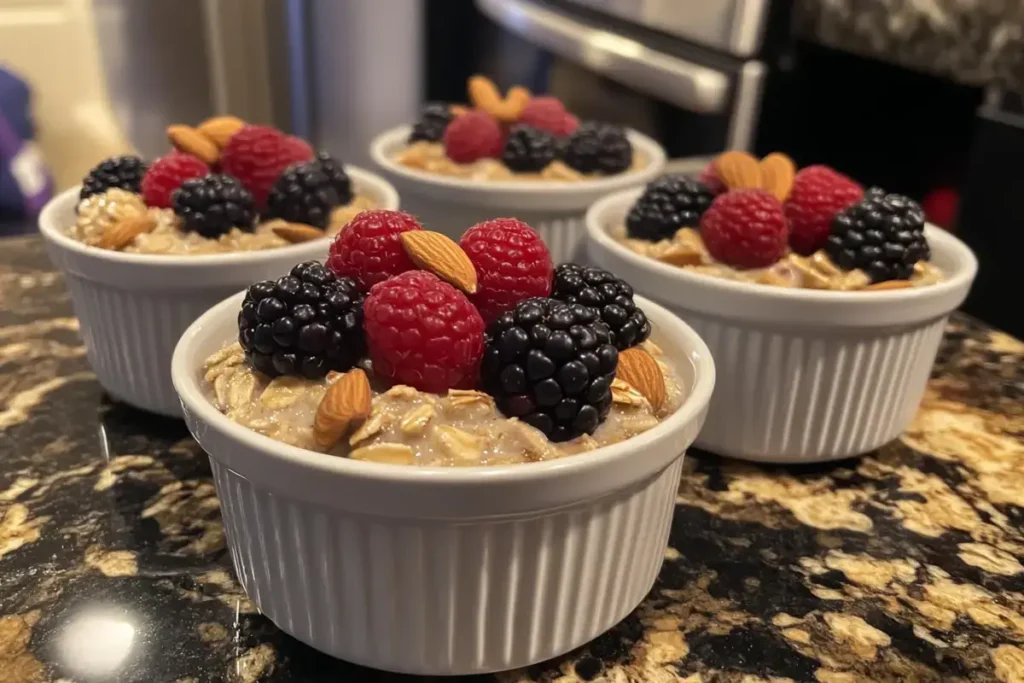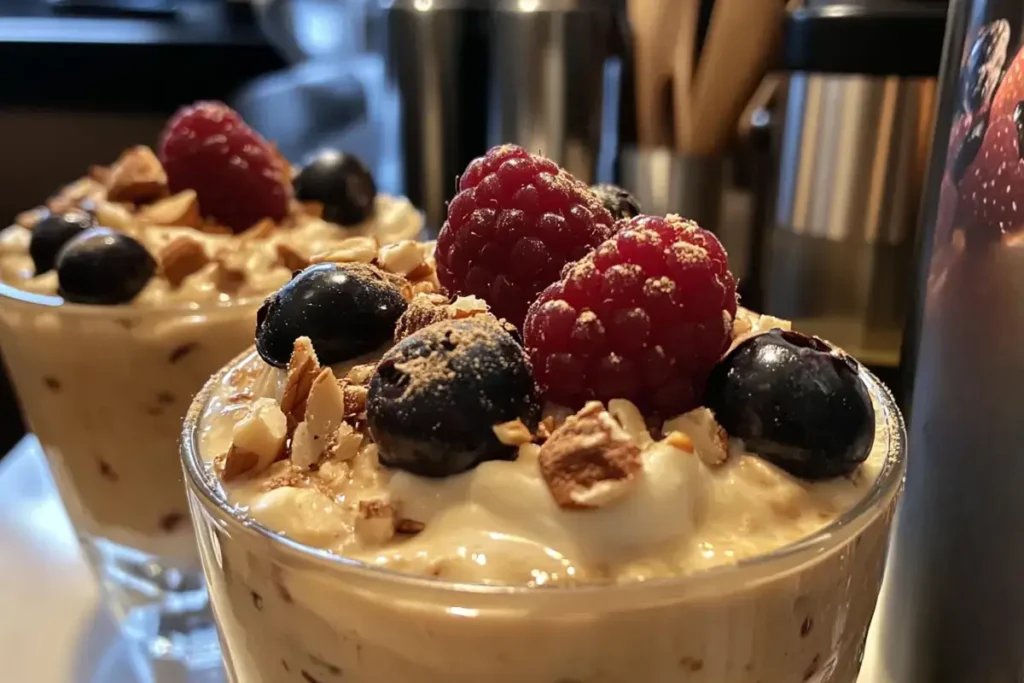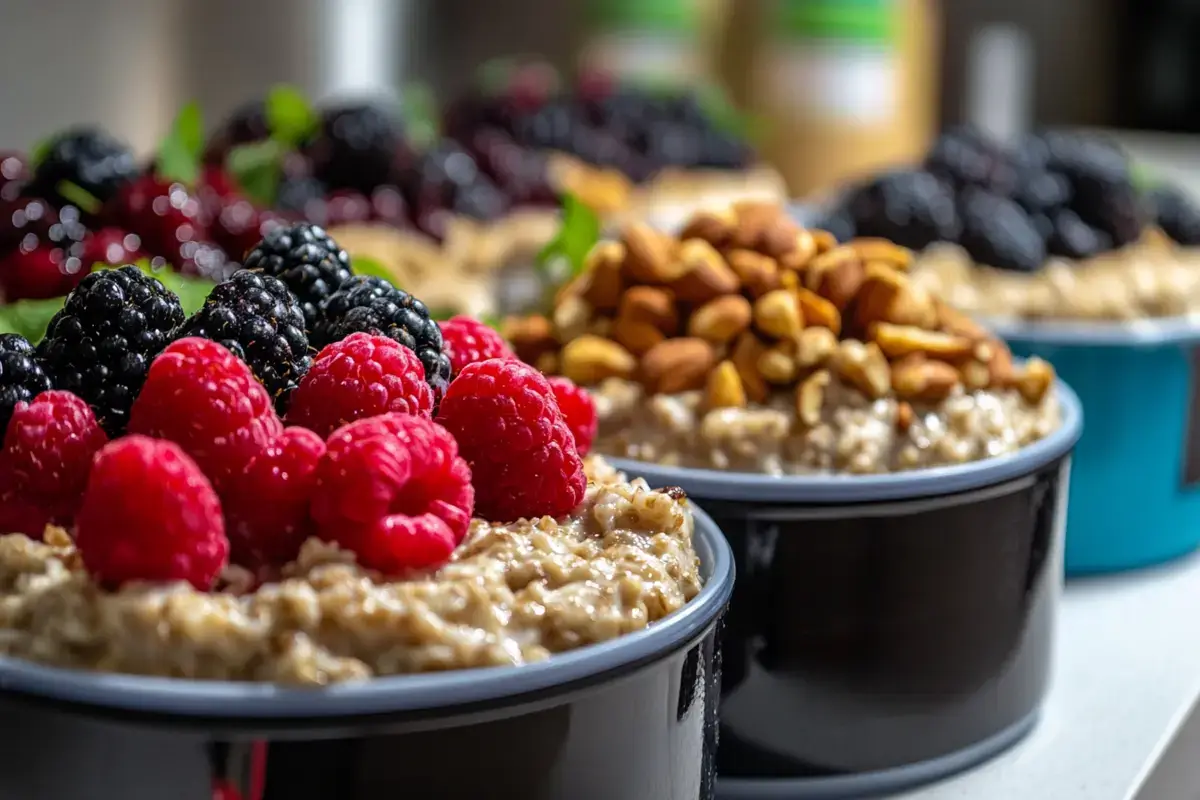Discover essential tips on what not to add in overnight oats? Avoid common mistakes, ensure perfect texture, and keep your breakfast both tasty and healthy.
Understanding Overnight Oats
Overnight oats have become a breakfast staple, especially for individuals seeking convenience. You simply combine oats and liquid, then let them rest in the refrigerator for a set number of hours. This process softens the oats, providing a creamy texture without requiring any stovetop cooking.
Initially, many people turn to overnight oats to save time in the morning. However, there is more to it than convenience. Overnight oats preserve nutrients in oats while reducing phytic acid, which can boost nutrient absorption. When prepared correctly, overnight oats supply a satisfying combination of fiber and protein. They also provide sustained energy throughout the day.
Additionally, this easy breakfast lets you personalize flavors. You can add fresh fruit, nuts, spices, yogurt, or sweeteners. Nonetheless, you should remain mindful when choosing ingredients. What not to add in overnight oats? becomes a critical question, particularly if you are aiming for a healthy, tasty meal. Some ingredients can compromise flavor or negatively affect nutritional value. Indeed, being selective about what goes into your jar can help you unlock the full benefits of overnight oats.
Most people find overnight oats delicious when they pair them with balanced additions. For example, adding fresh berries can boost vitamins, while including flax seeds provides healthy omega-3 fatty acids. Meanwhile, limiting excessive sweeteners or spoiled items is essential. If you ever wondered whether you should throw random leftover foods in your oats jar, it is best to pause. Generally, you want to ensure that each add-in contributes positively to taste and health.
Why this Matters?
Selecting appropriate items for your overnight oats can make or break your breakfast experience. What not to add in overnight oats? becomes a significant concern for several reasons.
Health Implications of Poor Ingredient Choices:
Many unwise add-ins have hidden sugars or artificial flavors. Consequently, these additions can negatively affect your blood sugar levels. What not to add in overnight oats? includes any high-sugar syrups or sweetened condensed milk because they can hamper your nutritional goals. Undoubtedly, your morning meal should offer consistent energy, not a quick sugar spike followed by a crash.
Moreover, certain ingredients contribute saturated fats or trans fats. These can undermine your overall heart health if consumed too frequently. Ultimately, if you are watching your weight or simply trying to stay healthy, keep a close eye on the nutritional details of every ingredient.
Flavor Balance and Taste Considerations:
Taste is subjective. However, overpowering ingredients like strong chili peppers or pungent herbs can completely mask the mellow goodness of oats. Indeed, subtlety is crucial. What not to add in overnight oats? includes certain spicy seasonings that do not mesh well with sweeter flavor profiles. Comparatively, intense flavors can become even more pronounced after soaking all night.
Likewise, extremely bitter ingredients can overshadow other flavors. The idea is to create harmony within your overnight oats jar. Rather than adding intense or clashing tastes, select complementary items that enhance the smooth, creamy base of the oats.
Texture Issues Caused by Certain Add-Ins:
Many people prefer overnight oats for their smooth, almost pudding-like texture. Nonetheless, certain additions can sabotage that texture. For example, raw crunchy vegetables, like carrots or celery, may stay too firm. They can create an odd consistency that feels contradictory to the soothing mouthfeel you expect.
Furthermore, some items can become slimy if left in the refrigerator overnight. What not to add in overnight oats? certainly includes ingredients that disrupt a comfortable texture. Indeed, the goal is to enjoy a creamy, balanced spoonful every time.

Common Pitfalls
Overnight oats are versatile, but there are popular pitfalls that can lead to disappointing results. If you know what not to add in overnight oats? beforehand, you can avoid these common blunders.
Ingredients That Introduce Too Much Sugar or Fat:
Many instant flavored oatmeal packets already have added sugar. Therefore, piling on honey, jam, or sweetened fruit yogurt on top can lead to a sugar overload. While natural sweeteners like maple syrup are better than refined sugar, you still need moderation.
Similarly, certain nut butters are packed with additional oils and sugars. Although nut butter can be healthy, choose natural versions without trans fats. Equally, watch out for sweetened coconut flakes, which can add unnecessary calories. Basically, keep your sweeteners in check.
Foods That Cause Rapid Spoilage:
Dairy products like fresh cream, if not stored properly, can spoil quickly. What not to add in overnight oats? includes potentially risky, easily perishable items, like raw eggs. Indeed, storing raw egg in a cold oat mixture for extended periods is not recommended.
Additionally, watch out for delicate fruits that can ferment or turn mushy, such as overripe bananas or berries on the verge of spoiling. In particular, always inspect fresh produce before you add it in. Spoiled items can damage the entire batch.
Items That Alter Nutrient Absorption Negatively:
Uncooked legumes, like raw beans or lentils, can interfere with digestion. They also contain antinutrients, which hinder mineral absorption. Furthermore, certain seeds with tough outer shells (such as unsoaked chia seeds) may not integrate properly, leading to an odd texture or digestive discomfort.
Moreover, caffeine-laden or stimulant-rich additions (like certain energy powders) can hamper your restful state at night. Conversely, if you only eat your oats in the morning, it might be less of an issue. Nonetheless, you want to ensure that your overnight oats remain easily digestible.
Your Ultimate Guide
Overnight oats can be quite exciting once you learn which ingredients to skip. By understanding what not to add in overnight oats? you avoid potential pitfalls and preserve taste, nutrition, and overall enjoyment.
Identifying Tricky Raw or Undercooked Items:
Always be mindful when adding ingredients that typically require cooking or special preparation. For instance, dried beans should never go into overnight oats in their raw form. Another example is raw flour, which can be problematic if not fully cooked or at least heat-treated.
In essence, if it usually demands a cooking step for safety, it might not be the best fit for an overnight oats mix. What not to add in overnight oats? includes these raw or undercooked foods that can pose potential health risks or hamper digestion.
Avoiding Strongly Pungent Flavors and Spices:
Overnight oats are often mild. Consequently, using pungent spices like cayenne pepper or strong herbs like rosemary can overpower the overall flavor. You can enjoy savory oatmeal if you wish, but harsh herbs or super-spicy seasonings may overwhelm your palate in the morning.
Think about balancing flavors. For instance, if you want a chai-inspired taste, incorporate cinnamon, cardamom, and nutmeg in moderate amounts. However, go easy on intense heat or bitterness. Indeed, what not to add in overnight oats? should include excessively dominating spices.
Skipping Misleading “Healthy” Options:
Certain health-labeled products are loaded with hidden sugar and additives. Protein powders, flavored yogurt, and packaged “fitness” cereals can contain artificial sweeteners or chemically refined components. Altogether, these can derail your efforts to keep your oats wholesome.
You might assume that a “high-protein” chocolate sauce is beneficial, but always check the labels. Especially if sugar is one of the first ingredients, reconsider adding it. What not to add in overnight oats? often includes such marketed items that do not truly align with whole-food nutrition.

Additional Tips for Perfect Overnight Oats
After learning what to avoid, it helps to know beneficial ways to improve your overnight oats. You do not have to limit creativity. Instead, select safe, flavorful, and healthy toppings or mix-ins that complement your taste preferences.
- Use High-Quality Oats: Rolled oats work well. Steel-cut oats can remain too tough. Quick oats might become mushy, though it depends on personal taste.
- Pick Suitable Liquid: Dairy milk, almond milk, and oat milk each offer distinct flavors. Choose unsweetened versions for maximum control over sugar levels.
- Add Fresh or Frozen Fruits: Berries, peaches, or bananas can be delicious, provided they are fresh and not close to spoiling.
- Incorporate Flavorful Spices: Cinnamon, vanilla extract, and a touch of nutmeg can enhance sweetness naturally. You do not need heaps of sugar.
- Stir in Quality Proteins: For extra protein, consider Greek yogurt or cottage cheese. Ensure they are in good condition and not near expiration.
Meanwhile, keep an eye on portion sizes. Particularly if you aim to manage weight, you want a balanced ratio of oats, protein, healthy fats, and fruits. Furthermore, consider making small batches if you are new to overnight oats. That way, you can experiment without wasting large amounts of ingredients.
In addition, storing your oats in airtight containers is essential. Mason jars are popular for this reason. They allow you to seal in freshness and preserve flavor. Be sure to refrigerate promptly. If you plan to keep them for multiple days, taste and smell the mixture regularly to verify freshness.
Often, it is best to add delicate toppings, like fresh berries or chopped nuts, right before serving. This helps maintain a pleasant texture and stops them from getting soggy. Furthermore, if you like a sweeter breakfast, try mashing half a banana or blending in a couple of dates for natural sweetness.
Ensuring your overnight oats remain safe, delicious, and healthy is straightforward once you follow these guidelines. Essentially, keep track of what not to add in overnight oats? and fill your bowl with nourishing, complementary ingredients.
Conclusion
Overnight oats are ideal for busy mornings or for individuals seeking a nourishing meal. However, they can only deliver maximum benefits if you choose your ingredients wisely. What not to add in overnight oats? stands out as an important question because certain foods will degrade flavor, texture, and nutritional value.
By focusing on foods that promote health—like fresh produce, whole grains, and moderate amounts of natural sweeteners—you maintain control over sugar content and overall quality. Meanwhile, skipping questionable add-ins, such as high-sugar syrups, raw beans, or clashing spices, ensures a smooth taste experience.
Ultimately, your perfect overnight oats recipe depends on balance. Avoid harmful, unsafe, or overpowering ingredients. Then, add items that heighten nutritional value and flavor. Experiment with various fruits, seeds, and nutritious liquids. This approach ensures you look forward to breakfast each morning.

Frequently Asked Questions
What to not put in overnight oats?
You generally want to avoid items that spoil quickly or dominate flavor. That includes fresh cream that can turn sour, raw eggs, and extremely pungent herbs. Also, skip large amounts of refined sugar or sugary syrups. In addition, watch for perishable fruits that might ferment.
What is the secret to overnight oats?
The secret lies in balancing ingredients. Choose rolled oats for the base, add an appropriate liquid, and select natural sweeteners in moderation. Furthermore, consider mixing in spices like cinnamon or nutmeg to enrich flavor without relying on added sugar.
What can you not mix with oats?
Avoid any ingredient that disrupts taste, texture, or safety. For instance, raw or undercooked beans can impair digestion. Additionally, extremely spicy or bitter seasonings can clash with the mild, creamy flavor. Also, do not mix in items that need to be cooked thoroughly for safety, such as raw flours or questionable powders.
Can you mess up overnight oats?
You can mess them up if you add too much liquid, fail to seal your container, or use perishable ingredients that spoil. Overpowering flavors or mixing in large quantities of sugar can also lead to undesirable results. However, with mindful preparation and smart ingredient choices, overnight oats are quite simple to get right.

